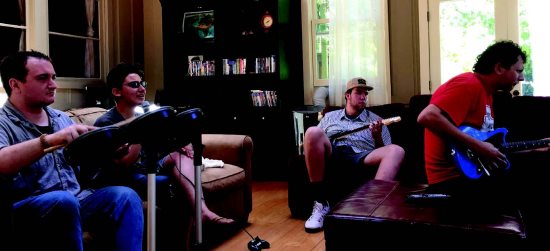
| ||||||
Sam's not alone. According to a 2015 National Institute of Mental Health report, 6.3 million teens suffer from an anxiety disorder, a number that has been steadily increasing.
Another rising statistic: the American Psychological Association reports 1 in 68 children are diagnosed as being on the autism spectrum (complex disorders of brain development characterized by varying degrees of difficulties in social interaction, communication and repetitive behavior).
Fortunately for Sam, and others like him, there is the Orinda-based Aspen Network, an organization helping young adults with social and behavioral difficulties learn to live a better and fuller life.
The Aspen Network was founded nine years ago by Meg Fields, who holds a doctorate in clinical psychology and spent more than 20 years as a psychiatric emergency room nurse, and her husband, Mike, who has been an emergency room nurse for more than 15 years. Wanting to provide a safe and accepting place for young people with social challenges, anxiety disorders and spectrum behaviors, Aspen Network offers programs for teens and young adults, enabling them to learn and grow with peers of their own in a comfortable and welcoming environment.
There are adventure-filled overnight retreats in Tahoe; One-on-One Coaching designed to help create goals and make next-step plans; and a weekly Living Skills Group, offering a safe space to share and learn. The newest program - the Team-Living PODs - offers co-ed residential living for young adults 18 years and older.
On a winding road in the Lamorinda hills, a group of Team-Living PODsters reside in a large house with a warm, inviting atmosphere. These residents may have social anxiety, depression, spectrum differences, learning disabilities or basic fear of the unknown; many have felt the need to isolate themselves in order to remain safe. "We understand that each individual is a whole, perfect person in an imperfect, judgmental world ... a world that does not always understand that accommodations and structure are necessary," Meg Fields stated. The PODs offer a comfortable environment where life skills needed for independent living can be learned and mutual respect and nurturing is emphasized so friendships can be formed, self-esteem can increase and "our young people can realize their potential to move forward," she noted.
Meg Fields explained that many of the PODsters drive, go to work, to school; she explained that they're frequently the people who did well in school but "get missed. They're often lacking in certain skills: organizing, prioritizing, remembering, observing, planning." They go off to college but without a parent or teacher guiding or assisting when they hit those proverbial bumps, they're unable to succeed. "They may begin to unravel and depression and anxiety peak," commented Liz Wilson-Palmer, an Aspen Network transition specialist.
This is what happened to J, an articulate former Aspen Network resident who recently moved from the POD to his own apartment - but returns frequently to see his friends. The 29-year-old, who preferred we not use his name, attended community college, only to discover that an AA degree "wouldn't get me very far. I went home and collapsed," spending most of his time alone in his room. He became a PODster, making friends and achieving goals. "The people, structure, community and group living provided a lot of positive experiences," J said. "There's just enough structure without being intrusive or overbearing. The program is very good at pushing you just to your limit, maybe stretching your comfort zone a bit but not bending you so far that you break."
J described the program as intense but positive and productive. His 18-year-old friend, Jennifer, an extremely bright and talented PODster for the past year, agreed, stating that Meg and Mike "give residents both options and freedom."
"Our residents have independence but most need an infrastructure to address their challenge areas," Meg Fields said. Wilson-Palmer agreed, noting that many "simply need that extra scaffolding to support them." For those that need it, basic daily living skills are built into Aspen Network's program. "Some need to be reminded to change their linens," Meg Fields stated, "or take a shower." Grocery shopping, cooking lessons, laundry training, and money management education are all offered.
Sam, the young man from Danville, has been a PODster for three years. He landed a job he enjoyed, proclaiming that "having that success and giving me more confidence allows me to branch out in other aspects of my life. [Aspen Network] gave me that first push. They don't guide you every step of the way; it's more like they give you a kick in the right direction," he said.
The Fields will soon be opening another residence to provide transformative experiences for more young people with social or behavioral challenges. For information, please go to aspennetwork.net.
Reach the reporter at:
